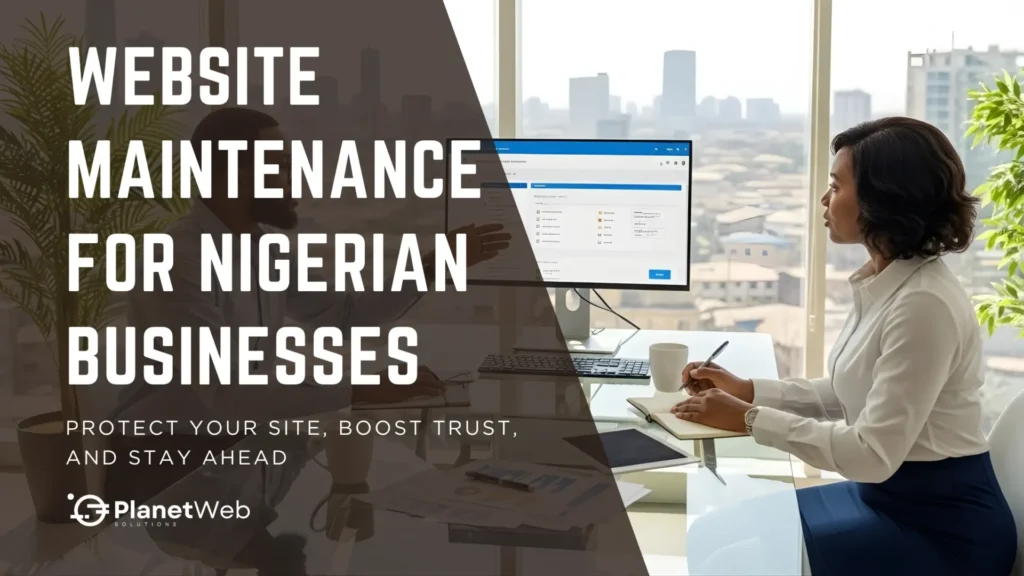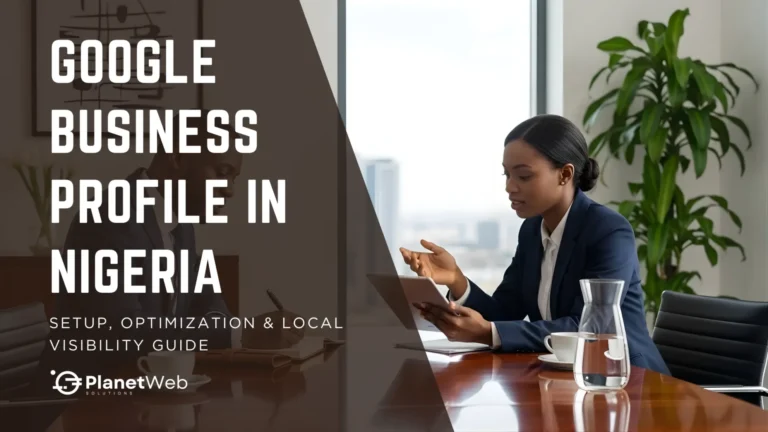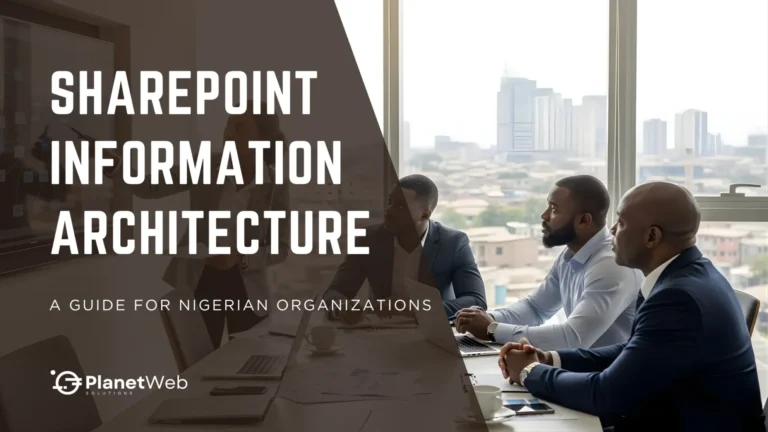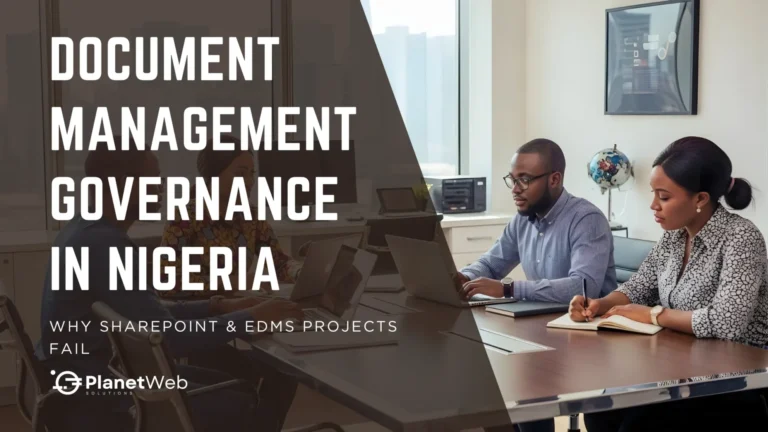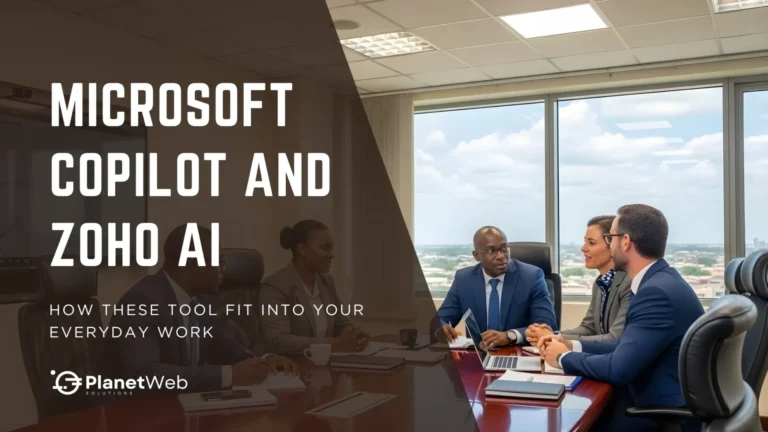Website Maintenance for Nigerian Businesses: How Regular Care Keeps You Secure and Profitable
Most Nigerian businesses put serious effort into building their websites. They hire designers, write copy, set up payment systems, and launch with excitement. Then something unfortunate happens: they treat the website like a finished project instead of an ongoing part of their business.
Think about it this way. Imagine opening a shop in Balogun Market and never restocking or cleaning it. You wouldn’t do that with a physical location, but plenty of businesses do precisely that with their websites. They launch, move on, and only think about the site again when something breaks, turning a digital asset into a liability.
Your website needs regular care to stay fast, secure, and profitable. This article explains what website maintenance entails, what can go wrong when you ignore it, and how to approach it, whether you handle it yourself or work with professionals.
What Website Maintenance Means
Website maintenance is a set of regular tasks that keep your site running smoothly. Security management protects against hackers and malware through software updates, monitoring, and strong authentication. Performance optimization ensures your site loads quickly, even with Nigeria’s varying internet speeds. Backup management creates copies of your site and stores them off-site. Software updates patch security holes and fix bugs. Monitoring alerts you when problems occur. Technical maintenance includes fixing broken links, testing forms, and ensuring everything works.
Most of these tasks happen behind the scenes. Visitors don’t see them, but they definitely notice when they’re not happening.
Why Website Maintenance Matters for Nigerian Businesses
When You Ignore Maintenance
Security becomes a serious problem. Outdated plugins are like leaving your shop unlocked. Hackers specifically target legacy software because its vulnerabilities are well documented and easy to exploit. A Lagos-based e-commerce site running an outdated WooCommerce installation was hacked last year. Attackers redirected checkout pages to fake payment forms. By the time the owner noticed, customers had already complained about unauthorized charges. The site got blacklisted by Google, sales stopped for three weeks, and rebuilding trust took months.
Downtime directly costs money. When your site is slow or broken, visitors leave. Research shows that if a page takes more than three seconds to load, many users abandon it. A mid-sized Lagos retailer processing ₦150,000 in daily sales loses ₦450,000 for every three-day outage. That’s just lost revenue, not counting customers who never come back.
Your reputation takes a lasting hit. Nigerians are already cautious about online transactions. Even a minor security breach makes customers question whether your business is legitimate. Trust takes months to build and minutes to destroy.
Data loss can end your business. Without regular backups, one server crash could erase years of customer records and business data. An Abuja consulting firm lost its entire client database when its server failed, and its last backup was eight months old. They spent a significant amount on recovery and still lost most of it.
What Consistent Maintenance Does
Security improves significantly. Regularly apply patches to vulnerabilities before hackers exploit them. This matters even more now that the Nigeria Data Protection Act (NDPA 2023) holds businesses legally accountable for protecting personal information. The Nigeria Data Protection Commission actively enforces compliance and can impose significant penalties for violations.
Performance stays consistent. Maintenance keeps your site optimized for Nigeria’s mobile-first users. Well-maintained sites typically load in under three seconds, even on 3G, while neglected sites often take 10-15 seconds or fail altogether. For advanced performance optimization, consider using Cloudflare for your business. For more on improving load times, see our WordPress speed optimization guide.
Search visibility improves. Google rewards sites that load quickly, have no broken links, and maintain technical health. Sites with consistent maintenance typically rank higher than competitors with similar content but poor technical health.
Trust builds naturally. A consistently available, fast-loading site signals reliability and professionalism. Customers notice when forms work, pages load fast, and checkouts complete smoothly.
Common Security Threats to Nigerian Websites
Understanding what you’re protecting against helps you take the proper precautions. For a deeper dive into protecting your site, see our comprehensive guide on WordPress security in Nigeria.
How Attacks Happen
Brute force attacks happen constantly. Automated bots try thousands of password combinations on your WordPress admin area. The default WordPress login URL makes you an easy target. Most Nigerian sites use predictable usernames like “admin,” making attacks even more effective.
Outdated plugin exploits are the most common successful attacks. When a flaw is discovered in popular plugins, hackers scan for sites still running vulnerable versions. The 2024 Welcart e-commerce vulnerability allowed hackers to inject malicious code into thousands of sites within weeks.
SQL injection via forms allows attackers to inject malicious code into contact forms or search boxes. Poorly coded custom forms are particularly vulnerable.
File upload exploits target forms that let users upload files. Without proper validation, attackers can upload malicious PHP files that give them server control.
Why Nigerian sites are targeted: Hackers assume Nigerian businesses operate sites on limited budgets and lack dedicated IT staff. Sites processing payments are especially attractive.
What Actually Stops Them
The good news is that most attacks can be prevented with straightforward measures. The WordPress Security documentation provides detailed guidance on implementing these protections:
- Change your WordPress login URL from /wp-admin
- Require strong passwords and enable two-factor authentication
- Update plugins, themes, and WordPress within days of new releases
- Use security plugins like Wordfence or Sucuri
- Limit login attempts to block brute force attacks
- Remove unused plugins and themes completely
- Keep only necessary WordPress user accounts
Essential Maintenance Tasks: A Practical Checklist
Daily (5-10 minutes)
Check that your site loads correctly. Review uptime monitoring alerts. Test critical functions, such as the cart or contact forms.
Weekly (30-45 minutes)
Review security scan results. Verify backup completion. Check contact form submissions are arriving. Review analytics for unusual patterns. Update minor plugins.
Monthly (2-3 hours)
Update WordPress core, all plugins, and themes. Optimize the database. Check for broken links. Review site speed using Google PageSpeed Insights. Test forms and key functionality thoroughly. Verify the SSL certificate is current. Check error logs.
Quarterly (4-6 hours)
Comprehensive security audit. Full performance audit. Content audit for outdated information. Mobile responsiveness testing on actual devices. Backup restoration test (critical – actually restore to verify backups work). Review hosting performance. Update privacy policy for NDPA compliance.
Tools That Help
If you’re handling maintenance yourself, these tools cover the basics without breaking your budget:
Free tools: UpdraftPlus for backups, Wordfence for security, WP-Optimize for database cleanup, UptimeRobot for monitoring, and Google Search Console for SEO health.
For more on establishing solid WordPress foundations, see our guide on WordPress website best practices.
Backup Strategy: Protecting Your Business Data
Backups sound boring until you need one. Then they’re the only thing that matters. Most Nigerian businesses discover they have a backup problem only after disaster strikes. For a complete breakdown of backup approaches, see our guide on website backup strategy for Nigerian businesses.
The 3-2-1 Backup Rule
Keep 3 copies of your data, on 2 different storage types, with 1 copy stored offsite.
- Copy 1: Your live website
- Copy 2: Backup on your server (protects against accidental deletion)
- Copy 3: Backup stored separately from your server (critical offsite backup)
Don’t rely only on your web host’s backups. They’re for their convenience, not yours. Store backups in Google Drive or Dropbox, or download monthly copies to an external drive. Never store backups only on the same server as your website. For guidance on selecting reliable hosting, see our guide to choosing web hosting in Nigeria.
How Often to Back Up
Daily for e-commerce sites, booking systems, or any site where data changes frequently. Weekly for blogs, informational sites, or relatively static content. Before any major change, always create a manual backup before updates or design changes.
Testing Backup Restoration
Test quarterly. Restore an older backup to a staging site and verify everything works correctly. This usually reveals problems you can fix before you actually need the backup. Untested backups are worthless.
That Abuja consulting firm that lost six years of client documentation? They had backups, but never tested them. When a disaster struck, the backups were corrupted and could not be restored. They spent ₦400,000 on data recovery specialists, who recovered only 30% of the lost data. Compare that to ₦20,000 annually for proper backup management.
Warning Signs Your Site Needs Immediate Attention
- Site loading time has noticeably increased
- “This site may be hacked” warnings in Google Search Console
- Unexpected redirects or pop-ups
- Contact forms stopped working
- Database connection errors
- Update notifications piling up for months
- Sudden traffic drops without explanation
- Slow WordPress dashboard performance
- Hosting company warnings about resource limits
- Expired or expiring SSL certificate
Get professional help immediately if your site is hacked, shows database errors you can’t fix, goes completely down, or faces NDPA compliance issues. For detailed steps on addressing compromised sites, see our guide to recovering a hacked WordPress site.
DIY vs Professional Maintenance: What Works for Your Business
| Aspect | DIY Approach | Professional Service |
|---|---|---|
| Cost | Your time (3-6 hours monthly) | ₦20,000-150,000+ monthly |
| Updates | When you remember | Scheduled and tested |
| Backups | You set up and hope they work | Automated, verified, tested |
| Monitoring | Manual checks | 24/7 automated monitoring |
| Response Time | When you notice problems | Often within 30 minutes |
| Compliance | You research NDPA yourself | Built into practices |
| Risk | All on you | Provider handles most risks |
When DIY Makes Sense
Small informational sites with minimal functionality. You’re technically comfortable with WordPress. You’ll consistently dedicate 3-4 hours per month to maintenance. Budget is very tight in the early stages (but plan to upgrade).
When Professional Help Makes Sense
E-commerce sites or sites that process payments should never operate without professional support. You’re handling customer payment information and processing transactions. One security breach or extended outage costs more than years of professional maintenance.
High-traffic sites need expert monitoring and optimization. Limited technical knowledge means you’ll spend excessive time on tasks or do them incorrectly. NDPA compliance requirements make professional help worthwhile. Multiple sites definitely benefit from professional management. You want insurance against disaster – professional services typically include guarantees and quick response times.
Minimum DIY Approach
If you absolutely cannot afford professional help:
Weekly: Verify backup completed, check for critical security updates, run a quick security scan, and verify site loads correctly.
Monthly: Update everything (WordPress, plugins, themes), test all forms, check for broken links, and review error logs.
This is emergency maintenance only. Upgrade your approach as soon as possible.
The Real Cost of Neglect
Even a small retailer can lose several days’ worth of revenue during a multi-day outage. Security breach recovery typically costs several hundred thousand naira, sometimes reaching millions, depending on the severity. Complete site rebuilds after catastrophic failures can cost anywhere from half a million to several million naira. NDPA penalties for data breaches can reach ₦10 million or 2% of annual gross revenue, whichever is higher.
Professional maintenance typically costs a fraction of what you’d spend on emergency recovery. The annual cost of ongoing maintenance is often lower than the cost of recovering from a single serious incident.
The cost of maintaining your website is predictable and manageable. The cost of neglecting it comes in sudden, expensive disasters you can’t plan for. For a broader perspective on protecting your business operations, see our guide on business continuity planning in Nigeria.
Conclusion
Your website isn’t separate from your business. It is your business in digital form. Website maintenance keeps your site secure, fast, and trustworthy. It protects customer data and your business reputation. It helps you avoid expensive emergencies and lost revenue.
Start wherever you are. If you’re doing nothing, implement the minimum approach. If you’re doing DIY inconsistently, establish a real routine. If you’re outgrowing DIY, transition to professional help. The worst maintenance strategy is no maintenance strategy at all.
For businesses that need ongoing technical support, PlanetWeb Solutions provides WordPress maintenance that handles security, backups, updates, and NDPA compliance so you can focus on running your business.
Frequently Asked Questions
Last updated: January 2026

